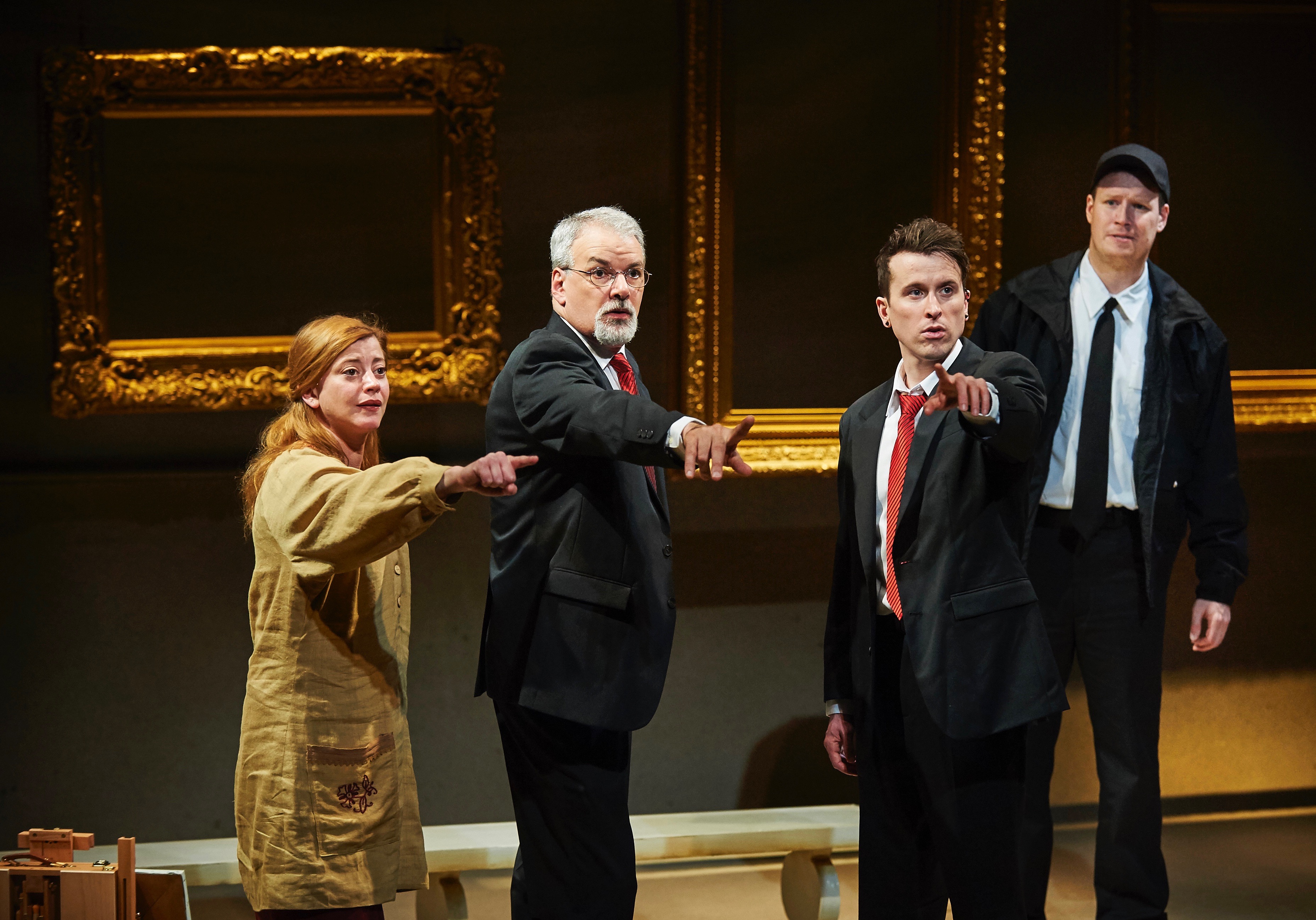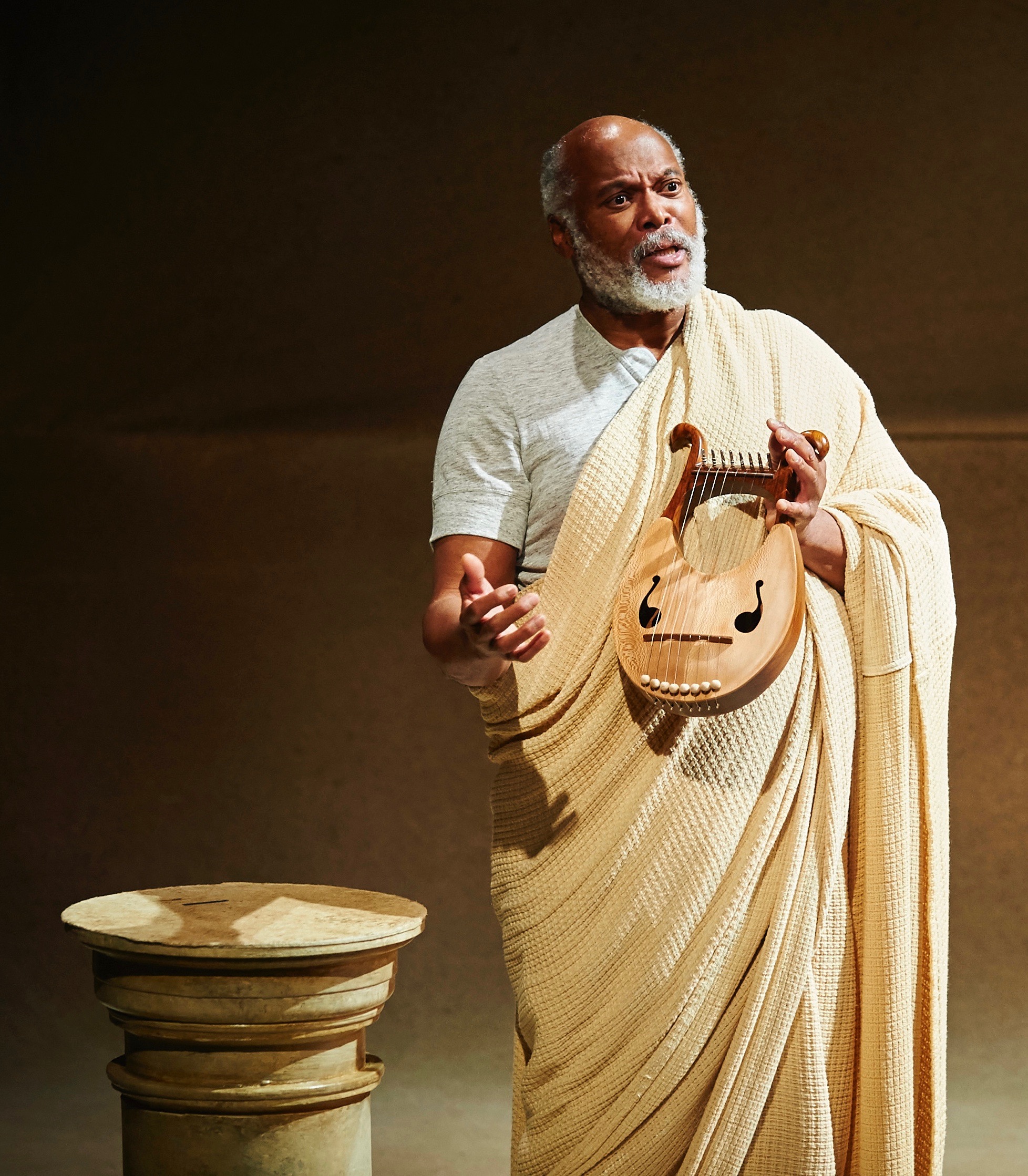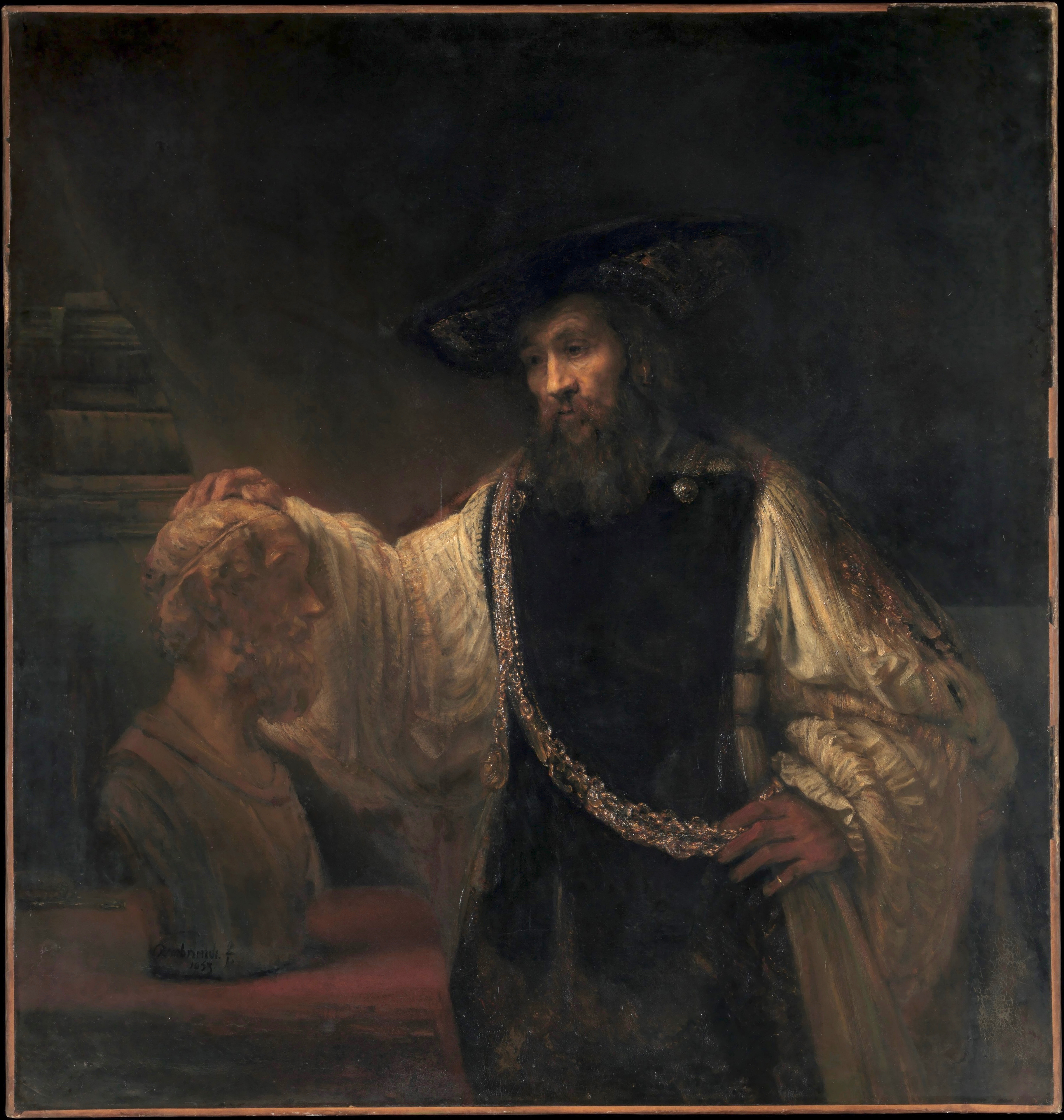‘The Guard’ Steps Out of the Ordinary

You think a smartphone screen is cool? Watch what happens when these characters touch a Rembrandt. Madeline, Henry, and Dodger (Melinda Helfrich, Andrew May, and Stephen James Anthony) take the plunge while security guy Jonny (Billy Hepfinger) exhibits great concern.
Jessica Dickey’s The Guard, currently at City Theatre, is an interesting play. Please let me explain what I mean by that.
The system of rating plays or movies on a scale from one star to four or five stars is inadequate, because the works do not exist only on a spectrum of good-ness, from bad to best. They also come in many different species.
The topmost type is the All-Around Great play. It is artfully done; it moves you profoundly—to laugh, cry, think, or whatever—and it stays with you in flashbacks. It is similar in many respects to great sex.
Meanwhile, there are at least three species of bad plays. They include the Disappointer (This thing won a Tony?), the Sleeper (Was I snoring?), and the Slapper, so bad you want to slap the playwright.
Somewhere in the middle ground is the Okay play: Okay, that was nice, now let’s eat.
And somewhere in another dimension is the Interesting play. Quality-wise, it is more than Okay, but mainly it is something other than Okay. It has an element that is out of the ordinary, inviting you to see things in a way that you hadn’t before.
The intended effect is somewhat like this: You are seated in the optometrist’s office, peering through the machine that the doctor clicks lenses into, when she slips in a wild-card lens and suddenly, the big E on the chart is no longer an E. Maybe it’s the face on the actual wild card in a deck, the face of the joker—except the face is your own. Or maybe it’s a dream sequence in which you are yourself and another person, too.
Though I have spoken in metaphor, that’s pretty close to what happens in The Guard, a play that never met a metaphor it didn’t mix.
Dualities Shimmer; Homer Hits It Out of the Park
The Guard is a humorous play, but one that gets into some serious table-turning in a quest to explore three classic dualities: life and art, love and death, time and the illusion that time might be just an illusion. If the foregoing makes your head spin, well, that’s the idea. A degree in philosophy might help, but it could be counterproductive, so don’t bother with deep analysis. This kind of material is meant to be ambiguous, not figured out—and we’ll get to the plot in a minute, but first, about Homer.

Homer (Raphael Nash Thompson) speaks in modern English in ‘The Guard,’ but it works. After all, ancient Greek was modern Greek back then.
Attending The Guard was my first experience in seeing the ancient Greek poet Homer portrayed on stage. He’s played here by Raphael Nash Thompson and he has one of the best entrance lines ever. As the berobed Homer walks in from the wings, he is shouting back thunderously to someone offstage: “Don’t write the damn thing down. It will fuck it up!”
The joke is of course an allusion to the fact that poetry in Homer’s time was sung, not put on a page to be read. Homer proceeds to extol the benefits of absorbing his work while you sit and listen. It allows the proper spell to be cast, and besides, he adds, “You have to be able to zone out in the boring parts. The Iliad is a damn long poem.”
If you’re going to see this play, it does help to know a wee bit about art and literature, or at least care about them. The script does a good job of filling in specifics that some patrons may not be aware of. I’m a fairly savvy art fan, but still learned a few things. Now for the plot.
Zap!
The Guard opens in an art museum. The title character, a gallery guard named Henry (Andrew May), is showing the ropes to a new guard, a young fellow who calls himself Dodger (Stephen James Anthony). There’s some tension between the two, as the irreverent and slightly surly Dodger and the older, jovial-uncle-type Henry struggle to find a common wavelength, but they do. Soon they’re involved in spirited back-and-forth with a fledgling art student, Madeline (Melinda Helfrich), who has brought in her paints to copy one of the museum’s old masterpieces.
The masterpiece is Rembrandt’s 1653 painting “Aristotle with a Bust of Homer.” Although gallery guards are supposed to keep people from getting too close to the art, here’s Dodger urging Madeline to touch the painting. Next thing you know, all three of them—Henry, Madeline, Dodger—are lined up to touch it together. And when they do, we’re zapped into the world in which the painting was made.

Oh, Rembrandt! Is that a paintbrush in your pocket or are you glad to see me?
The actors who’ve played the trio become Rembrandt, his wife, and his son. We find that the painter runs a cheerfully hedonistic but hectic household, and ironies emerge. (Rembrandt, for instance, doesn’t want to paint the Aristotle-and-Homer picture. He thinks the idea is utterly stupid, but it’s a commissioned job and the family needs the money.)
Then later, a spirit from the deeper past is summoned when Homer appears to deliver his stormy soliloquy.
Furthermore, Homer (or at any rate the actor playing him) turns out to be—and I will stop here. We are entering spoiler land. Suffice it to say that currents of pathos and personal drama run through the funny stuff, linking the ghosts of art past to the modern-day museum crew.
Meta-Questions
And, amid the scene-shifting, questions of meaning arise. For example, clearly we’ve got a cast of actors playing double roles: Andrew May is gallery guard Henry, then (with a rapid makeover) he’s Rembrandt, and so forth. But are we meant to believe that the characters themselves magically “become” those long-ago people—that Henry is reverse-reincarnated as the Rembrandt he so admires? That art student Madeleine—who, in the museum, has daringly voiced a secret wish to make love to a painter—gets her wish by transforming into Rembrandt’s lusty young wife?
I certainly took it that way while watching. Or anyhow, I sort of figured that even if the characters weren’t “really” transformed, they were imagining themselves cast into the various old-time roles … while at the same time, of course, there were “real” actors role-playing the characters … which would make The Guard a play within a play within a something-or-other, thereby making meta-statements about, uh, something. Wouldn’t it?
I don’t have meta-answers for these meta-questions. You can see, though, why the play fits in the Interesting category. Want to give it a go? Details below.

Rembrandt’s ‘Aristotle with a Bust of Homer.’Want to give it a go? Details below.
Closing Credits and Ticket Info
Dickey’s The Guard is directed for City Theatre by Tracy Brigden, the company’s artistic director. Along with actors mentioned above, Billy Hepfinger plays Jonny, a museum security officer, plus another role.
Through April 2 at 1300 Bingham St., South Side. For showtimes and tickets, visit City Theatre online or call 412-431-CITY.
Photos in this review are by Kristi Jan Hoover. Reproduction of Rembrandt’s painting, courtesy of the Metropolitan Museum of Art.
Mike Vargo, a Pittsburgh-based freelance writer, covers theater for Entertainment Central.
Share on Social Media
Follow Entertainment Central
Latest Stories
Sign up for the EC Newsletter







